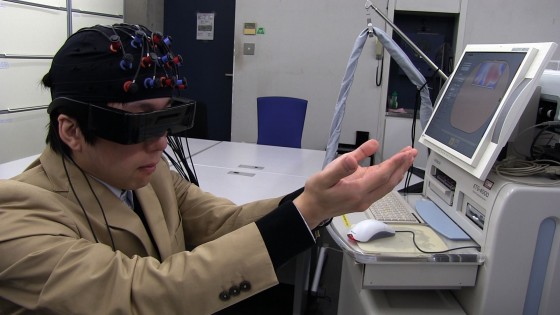
Robohub.org
Seeing is touching

Professor Takashi Kawai’s lab at Waseda University’s School of Fundamental Science and Engineering is conducting research on a cross-modal perception technology employing multi-sensory integration in which participants perceive tactile sensation from visual stimulation. In a visual-evoked “minute tactile sensation” presentation system prototype, a very simple mechanism is used to enable the phenomenon of tactile sensation perception, despite the lack of any physical contact, simply by viewing a video image.
“One element of the system is the use of a see-through head-mounted display to present a stereoscopic image. Unlike when typically viewing an image on a display, it is important here for the image to be viewed in space. An extremely important aspect in constructing this system is that the participant is able to observe in a natural manner a part of his or her body such as the hands making contact with the image.”
First, a commercially available see-through head-mounted display is worn. An image of an object floating about 30cm in front of the eyes becomes visible. Presently this object is displayed as a ball of fire or ice to represent temperature sensation. The participant places his hands as if touching the viewed object so that the ball of fire or ice is observed resting on the hands. By adjusting the hands so that the object is touching the palms and then by gently shaking the head left and right so that a slow-speed motion is perceived, he can experience a subtle tactile sensation such as a slight breeze or cool or warm sensation.
“Feasible areas of application are entertainment or communication, or as a new form of media for producing visual content to induce tactile illusion. Or for more serious applications, there are various possibilities for consideration including rehabilitation as well as training and education where this type of system can be used effectively.”
With the prototype system, the research group has discovered that the participant’s perceived tactile sensation will change qualitatively, such as a sensation of warmth or cold, according to the content of the video image. The group will continue to conduct research on video content with associated tactile sensation and search for effective utilization of tactile sensation in fields such as education and social welfare.
tags: AR, perception, Research




